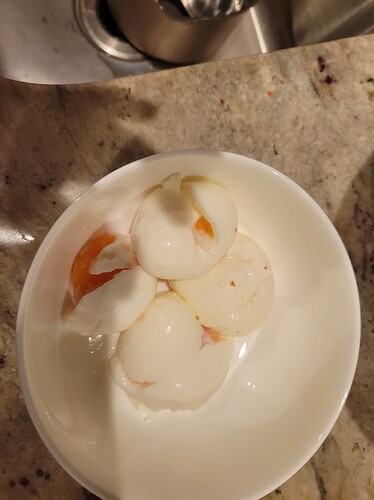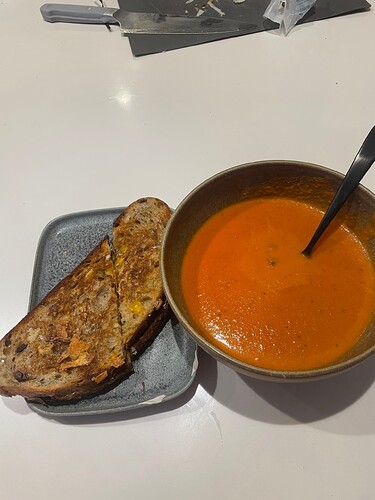The victornix or whatever it’s called makes a good meat slicing knife. It’s what I use.
How did you do the eggs? Looks like you boiled them in soy or some other mixture?
Do you scrape the cutting board when pushing things off with the blade side or the back side of the knife? Use the back side if you aren’t using it now.
Are your cutting boards glass? That will dull a knife too.
Generally use the thin flexible plastic-y ones. Will scrutinize my scraping, there certainly is a chance ty for the tip.
Yeah, the backside of the knife meaning turn the knife over, in case it wasn’t clear.
Hoping to get some help developing a science-based understanding of what’s going on between two different prep/cooking scenarios…
I have been BBQ’ing a bunch of previously frozen meat, and I’m noticing that the cook times are dramatically shorter compared to exact same cuts that are cooked from-fresh.
In the from-previously-frozen scenarios, I’m buying the meat, trimming it, seasoning it, then freezing it. I’ll defrost it overnight in the fridge/on the counter, then toss it on the smoker when the internal reads ~38F.
Basically, it’s going like this:
| Cut | From Fresh | From Previously Frozen |
|---|---|---|
| Spatchcock Chicken (4 lbs) | 90 minutes at 300F | 60 minutes at 300F |
| Beef Dino Ribs (6 lbs) | 9.5 hours at 250F/275F | 6.5 hours at 250F/275F |
Can anyone explain ‘what’s going on’ between the two preparation methods that’s causing the disparity in cook times? I was talking to a BBQ buddy and he said that sometimes competition guys will freeze and then defrost their meats before seasoning and cooking. His guess is that they (competition guys) do this to pull excess moisture from the meat and make the tenderization/cooking process easier/better.
I’m wondering if maybe there’s a lot of evaporation happening during the freezing/defrosting process that is 1. reducing the weight/mass of the meat and/or 2. eliminating any stall from the cooking process.
I guess my general hypothesis is that the salt in the seasoning blend is pulling out moisture from within the meat, and said moisture is then evaporating as part of the freezing process.
Any thoughts?
I would not expect evaporation as much as cell rupture, which frees the water to evaporate or just drip
Alright, so are you saying that the cell rupture is a result of the pre-seasoning with salt or the freezing? Or both?
This has been a pleasant surprise for me, too. The meat is not tasting dried out, stringy, or cured. It’s still super juicy, fatty/succulent, and packed with flavor. I’m convinced that a layman, without prior knowledge of the meat being frozen, would be able to tell that it was indeed not cooked from-fresh.
It’s definitely drying out in the freezer but also little ice crystals are probably tenderizing it like wookie says.
I’m also assuming that freezing and thawing weakens the muscle fibers. The main cause of excessive moisture loss is the muscle fibers tightening and literally wringing water out of the meat.
Similarly, tenderizing is just mechanically or chemically weakening the muscle fibers.
Sous vide in water and rice vinegar. Then ice bath, peel, and into a soy sauce/rice vinegar/sesame oil marinade overnight.
uhg. We’re having ramen tonight. Guess it’s just plain old jammy eggs instead.
Couple hours works too
Ok, somebody have some tips on making jammy/soft boiled eggs? Every time I try them they end up like this, with me cussing while trying to peel them:
I let them rest in ice water before peeling, maybe that helps.
I did that. Still a mess.
Can you tell us your process? Ive found success with both a sous vide and an instant pot, but my boiling in a pot always leaves them like this
Boiling in a pot.
I have both an instant pot and a sous vide so I’ll try one of those. Thanks!


